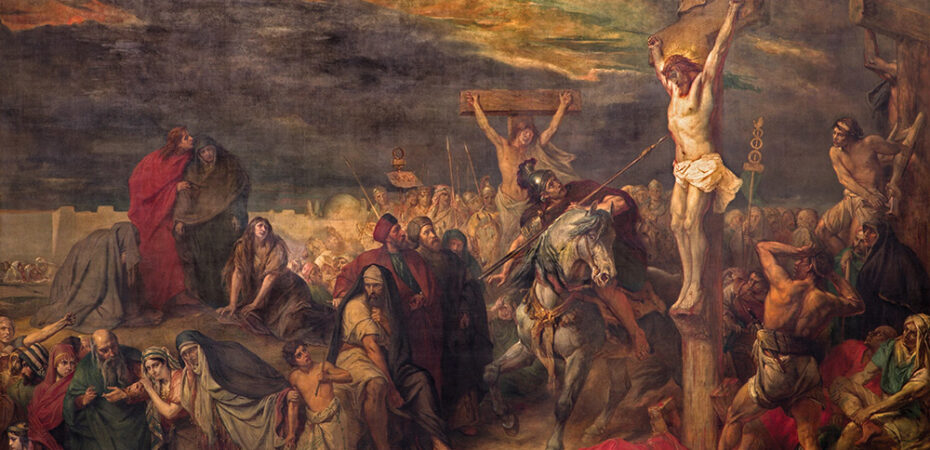‘The Scepter Shall Never Depart from Judah’
Exploring the Messianic prophecies in light of Genesis 49:10
Father Harry Hagan Comments Off on ‘The Scepter Shall Never Depart from Judah’
“The scepter shall never depart from Judah, / or the mace from between his feet, / Until tribute comes to him, / and he receives the people’s obedience.” — Genesis 49:10
Just before Jacob dies in Egypt, he blesses all his sons and makes Joseph promise to return his bones to the land promised Abraham. Some scholars have held that this text is ancient. However, dating these types of texts is a precarious enterprise. While some cases are clear, scholars are often on every side of the argument, as here.
This verse is part of Jacob’s blessing of Judah. Within the sweep of the Old Testament story, Jacob’s blessing serves as a prophecy about the Davidic covenant, the promise of a dynasty forever: “Your house and your kingdom are firm forever before me; your throne shall be firmly established forever” (2 Sm 7:16; cf. Ps 89:36-38).
The last two lines of Genesis 49:10 present some textual difficulties, but the sense is clear. The prophecy extends this sovereignty beyond Judah to the peoples of the whole world.
Scepter of Justice and Peace
The Hebrew word for “scepter” (shebeṭ) means, first of all, “stick, staff, rod.” It may refer to a shepherd’s staff, as in Psalm 23: “Even though I walk through the valley of the shadow of death, / I will fear no evil, for you are with me; / your rod (shebeṭ) and your staff comfort me” (v. 4).
Joab uses it as a weapon and thrusts three into “the heart of Absalom” as he hangs by his hair in a tree and so kills the rebel son (cf. 2 Sm 18:14). As both a shepherd’s staff and a weapon, this rod comes to represent royal power.
We see this already in the Code of Hammurabi, king of Babylon from 1792 to 1750 B.C. In the epilogue, Hammurabi says: “I am indeed the shepherd who brings peace, whose scepter is just” (3185’-3188’).
The Akkadian word for “scepter” (ḫaṭṭu), like the Hebrew, means, first, “rod, staff.” Hammurabi claims the title of shepherd for himself and then joins peace with justice under his scepter. Well before David, who reigns around 1000 B.C., the culture holds the king responsible for the justice that brings peace. A little later, Hammurabi says about the people of his kingdom: “Under my protective spirit, they prospered; in peace I maintained them, with my skillful wisdom I sheltered them. That the mighty the weak not wrong, for the [fatherless] and the widow to provide just ways” (3196’-3205’)
Hammurabi asserts that the king must be wise and just to make and adjudicate the laws that ensure peace. He takes responsibility for those with no voice in the public realm, the fatherless and the widow so “that the mighty the weak not wrong.” Deuteronomy adds the alien to those without a voice because Israel was once a stranger in Egypt (cf. Dt 10:18-19).
Royal Theology of Jerusalem
This large understanding of kingship fills Psalm 72, which begins: “O God, give your judgment to the king; / your justice to the king’s son; / That he may govern your people with justice, / your oppressed with right judgment, / That the mountains may yield their bounty (shalom) for the people, / and the hills great abundance (ṣedeqah), / That he may defend the oppressed among the people, / save the children of the poor and crush the oppressor” (vv. 2-4).
The English word “peace” can suggest passivity and calm. The Hebrew word shalom has a more vital meaning of “being whole, intact” and, therefore, having what you need to live. As a result, shalom means “prosperity” or “bounty,” which is the fruit of peace. The NABRE translates the parallel word “great abundance,” but the Hebrew ṣedeqah has the common meaning of “righteousness” or “justice.” The integral relationship between justice and peace is not a modern slogan but an ancient insight that the Bible inherits from its own larger world.

All of this and more becomes the foundation for the Royal Theology of Jerusalem that celebrates the Lord as King: “The LORD is king; let the earth rejoice; / let the many islands be glad. / Cloud and darkness surround him; / justice and right are the foundation of his throne” (Ps 97:1-2).
The Lord of Host, a warrior deity standing on the ark, takes his seat unseen on the cherubim throne in Jerusalem. The niches of the Canaanite temples held a statue or some symbol of the deity, but in Jerusalem, the Lord is enthroned unseen in the Holy of Holies with the ark as his footstool. The Jerusalem temple becomes the very dwelling place of God. This imageless manifestation of the Divine holds together the transcendent and the immanent.
The Davidic king becomes a central manifestation of the Lord’s kingship, and the Davidic covenant, with its promise of a “kingdom forever,” links the king intimately to God. Some have even argued that the king in Jerusalem was considered a deity like Pharaoh in Egypt. Psalm 45 begins by exalting Jerusalem’s king and then says in verse 7: Your throne, O God, stands forever; / your royal scepter (shebeṭ) is a scepter (shebeṭ) for justice.
Some have argued that the verse addresses the Davidic king as a deity. Even if that were its original sense, that meaning does not fit with the Old Testament as it stands. The Davidic king serves only as a sign pointing to God as the true king.
Book of Desire
Still, the Old Testament is a book of desire, and the desire for something more appears in the prophet Isaiah who builds on the Royal Theology of Jerusalem. Isaiah 9:1-6 celebrates the birth of a new Davidic king who will be the light in the darkness and the one by whom God will break the “rod” (shebeṭ) of the taskmaster. Isaiah then says, “They name him: Wonder-Counselor, God-Hero, / Father-Forever, Prince of Peace” (v. 5)
Commentators will point out that names in the Old Testament were not to be taken literally, but as celebrated attributes of God. Even so, the Old Testament is a book of desire. The largeness of this text imagines someone who somehow not only points to the kingship of God but can, in his own person, realize that desire.
These titles appear nowhere else. Their only context is this passage of hope, and they invite us to find connections. Wonder-Counselor offers a creative juxtaposition. Wonder appears in the psalms to name the magnalia Dei, God’s deeds, particularly in Egypt, and a counselor gives advice, particularly to a king, but here not only prudently but wondrously. God-Hero suggests the warrior deity of this theology. The king must be a battle hero to ensure peace. Hero, in this instance, describes the dead Goliath in 1 Samuel 17:51, whose defeat makes David the greatest of biblical heroes (cf. 2 Sm 17:10), except for the LORD at the Red Sea and everywhere (cf. Ex 15:3-4). The English Father-Forever adds perhaps something to the Hebrew. Our notion of infinity comes from the Greeks, especially Plotinus. The Hebrew word suggests a continuing future beyond imagining. The title Prince of Peace appears only here and captures the ideal seen already in the Code of Hammurabi. Finally, we should add Emmanuel, “God-with-us,” from Isaiah 7:14 — surely a name of desire.
The Desire of Every Nation
David began his reign in Jerusalem around 1000 B.C., and the Davidic dynasty endured until the Babylonians destroyed Jerusalem in 586 B.C. It is a long reign by human standards. When it ends, the priestly tradition creates a way for Judah to live without a king amid a foreign culture while maintaining their own identity. This move leaves behind the universalism that we see in the later parts of Isaiah: “Nations shall walk by your light, / kings by the radiance of your dawning” (Is 60:3).
Also, the separateness of the priestly tradition proves dangerous when governments turn against them, as in the time of the Maccabees. The apocalyptic movement arises in reaction to this threat and asks how God’s promise to David remains real. The movement begins to look for the promised Messiah who would overthrow the forces of evil and establish a new kingdom of justice and peace (cf. Dn 7-11).
The Messiah and the kingdom of God come, but not as the apocalyptic movement imagined. The Messiah comes as a servant and wins his victory by dying on a cross so that God could raise him. The kingdom of God offers people the possibility of repenting and believing the Gospel. Jacob’s prophecy to his son Judah is fulfilled in a way he could not have imagined. The birth of this Messiah makes real the hope for a king who would hold together heaven and earth, divinity and humanity in the unbreakable bond of his person. Therefore, this Messiah, the Christ, is able to lay claim to the names of Isaiah: Wonder-Counselor, God-Hero, Father-Forever, Prince of Peace and Emmanuel. This Messiah claims the scepter not just for Judah but for the peoples of all the earth.
FATHER HARRY HAGAN, OSB, SSD, is associate professor of Scripture at Saint Meinrad Seminary and School of Theology.
…………………………………………………………………………………………………………………………………………..
Messianic Hope
“The word ‘Christ’ comes from the Greek translation of the Hebrew Messiah, which means ‘anointed.’ It became the name proper to Jesus only because he accomplished perfectly the divine mission that ‘Christ’ signifies. In effect, in Israel those consecrated to God for a mission that he gave were anointed in his name. This was the case for kings, for priests and, in rare instances, for prophets. This had to be the case all the more so for the Messiah whom God would send to inaugurate his kingdom definitively. It was necessary that the Messiah be anointed by the Spirit of the Lord at once as king and priest, and also as prophet. Jesus fulfilled the messianic hope of Israel in his threefold office of priest, prophet, and king.” — Catechism of the Catholic Church, No. 436
……………………………………………………………………………………………………………………………………………





